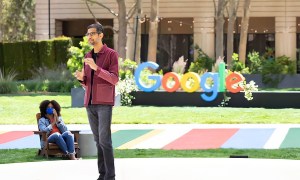

Google Play Store customers — some 2.5 billion souls in more than 190 countries — have a new app and game review calibration to look forward to in August, according to Kobi Glick, product lead of Google Play. Speaking at a deep-dive session at Google’s annual I/O developer conference, the Play team departed from the usual code-speak to reveal an updated approach to app reviews designed to focus on more recent, and thus more relevant, reviews that app and game developers believe will better serve the public and provide a more accurate reflection of their apps.
“Many of you told us that you want a rating that reflects a more current version of your app, not what it was years ago — and we agree,” Glick said. “So instead of a lifetime cumulative value, your Google Play Store rating will be recalculated to give more weight to your most recent ratings.” Users won’t see the updated rating in the Google Play Store until August, Glick said.
The ratings adjustment goes hand-in-hand with a suggested replies feature, which makes it easier for developers to respond to user reviews in the Play Store. When developers wish to respond to a user comment or question they can view three suggested replies, automatically created based on the content of the user comment. Developers can choose the auto-suggested response, customize it, or create a new response. Users may perhaps note more uniformity and/or a higher response rate to their Play Store comments as a result of suggested replies. This feature is now available only in English, with additional languages planned for the future.

People should also look forward to updated Play Store app icons. Google asked developers to streamline their app icons by June 24 to meet its new specifications, but a legacy format built into the store will keep older icons looking fresh. Behind the scenes, Google’s Dynamic Features emerged from beta, offering app developers more customizable delivery options to benefit users and reduce and optimize app size. Among the features are in-demand delivery and conditional delivery, which lets developers install features as needed or in the background and control installation based on a user’s country, device, and minimum software development kit version.
Google Play now has made its in-app updates API generally available, which will allow users to seamlessly update to the latest app versions. The new API either propels users to immediately download and update an app or lets users download an update while using the app.

Google also announced a new early-access program for developers that allows them to create custom listings in the Play Store, as well as customized marketing messages to users, based on installation. These are targeted to users who did not install an app, users who did install an app, and users who uninstalled an app. With Google’s pre-registration feature, developers can generate awareness about apps and games before publishing them on the Play Store. Taking the concept further, Google is now launching custom listing pages for pre-registration and pre-registration rewards, which let developers offer in-app gifts or other incentives to users in exchange for signing up for pre-launch notifications.


